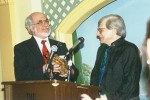Sometimes you don’t need to say much when introducing a drive-by victim This is one of those times: Bob Weinberg, writer, editor, collector, and the dad of the legendary Arkham House.
1. The inspiration for Arkham House was …
In 1939, two successful authors, August Derleth and Donald Wandrei, decided to publish a hardcover collection of short stories by their late friend and mentor, H.P. Lovecraft. Lovecraft, who had died in 1937, was considered by many to be the finest horror writer of the 20th century, yet no mainstream publisher was willing to take a chance on a volume of his short fiction. Derleth and Wandrei named their new press, Arkham House, after the eerieNew Englandvillage where most of Lovecraft’s stories took place. Over the next seven decades, Arkham House published the best horror and supernatural fiction in the world. A brother-in-arms press, Mycroft & Moran, issued mysteries.
The goal of Arkham House as established by Derleth and Wandrei, then continued by Derleth alone when Wandrei was drafted, was simple. Arkham House was dedicated to publishing the finest horror fiction available, in attractive limited hardcover editions. Books were selected by merit, not on whether they were commercially viable projects. Quality of content was what made Arkham House the most honored and imitated small press in the fantasy field.
August Derleth died in 1971. Arkham House was taken over by his children, April and Walden Derleth. James Turner was appointed editor and ran the company to 2000. Peter Ruber took over editorial duties in that year. Several years later, Rubert suffered a stroke and had to resign his post. April Derleth asked me, Robert Weinberg, a lifelong Arkham House fan and friend of the family, and George Vanderburgh, an expert in small press publishing, to take the editorial reins of the company in 2009. We’ve been editors since then. Recently, April Derleth unexpectedly passed on. Her children now own Arkham House. The small press is in the midst of transition, but both of April’s children have expressed strong feelings that the company will remain in business.
No doubt, the same mission, to publish the finest horror and mystery fiction in attractive hardcover format, that originally inspired August Derleth, will remain the goal of Arkham House in the future.
2. How have you balanced writing, editing and comics (which makes you a triple threat, btw)?
Actually, all of my endeavors arise from my love of the science fiction and fantasy genres. I always loved to read novels and short stories of SF and fantasy and have been a fan of such literature for more than fifty years. I decided when I was 11 years old I wanted to be a writer and have been faithful to that dream ever since. I started writing then and never stopped. I’ve written novels, short stories, non-fiction books, essays, articles, and just about everything else there is to write except cereal boxes. And I’d love to write them too, if given the chance.
Comic book writing came about because editors at Marvel and DC Comics read some of my novels and thought that I could probably write a good comic book script. I had followed comics for many, many years and jumped at the chance to script some stories. It was fun and I enjoyed doing it a great deal.
Editing came about as I had read so many stories and have a tremendous memory for what I read. So, with some free time on my hands, I put together some collections of short stories that I thought would make a good book on a certain theme. A publisher agreed with me, and that’s how my first edited book came about. It was a success and I decided that I would do more. It was a good excuse for me to read as much science fiction as possible.
3. You get to choose your favourite ten stories for a dream anthology – what do you choose?
Only TEN!!! I have more favourite stories than that. Without question, I would pick “To Follow Knowledge” by Frank Belknap Long (Astounding Stories, 1942) as that’s my #1 favourite story. Then “By This Axe I Rule!” by Robert E. Howard (from the book, KING KULL), “The Scarlet Citadel” also by Robert E. Howard, a Conan story, “The Case of Charles Dexter Ward” by H. P. Lovecraft, “The Thing on the Doorstep” by H.P. Lovecraft, “But Without Horns” by Norvell Page (Unknown, 1940), “The Monster” by A.E. van Vogt (Astounding, 1948), “The Vault of the Beast by van Vogt (Astounding 1940), “The Roaring Trumpet” by L. Sprague de Camp (Unknown, 1940), and finally, “The Face in the Abyss,” by A. Merritt (the short story version, from Argosy, 1924). That’s a rather unusual crew of some of my favorites.
4. You get to travel anywhere and anywhen for a day – where do you go, what do you do and who is your companion?
Sounds like the ultimate Dr. Who story. Assuming I couldn’t travel with the Doctor (my first choice, as talking with a time lord would be interesting to say the least), I would really enjoy traveling with Tom Paine, the famous American patriot and rabble-rouser, to Philadelphia in 1776 and witness the signing of the Declaration of Independence.
5. Donuts or danishes?
A cheese danish every time. I like donuts, but they are fried and at 65 I am trying to eat healthy, so donuts are no longer part of my diet.
His ite is here.




